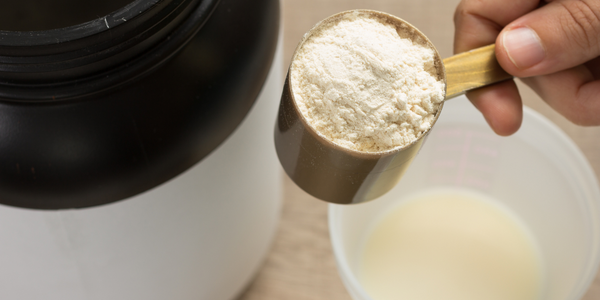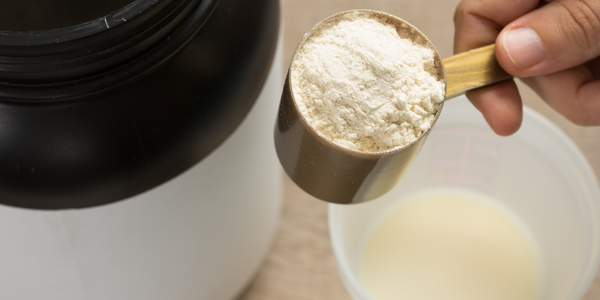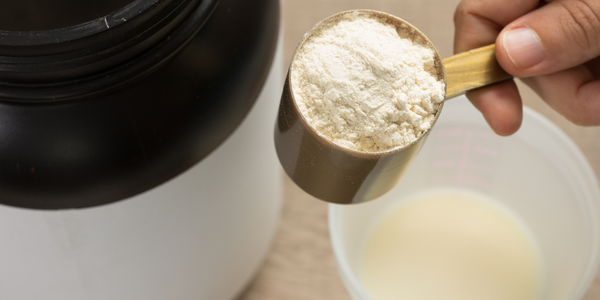If you think you can't gain enough protein because you are vegan or vegetarian, you might be wrong. Plants provide plenty of protein to fuel your post-exercise recovery, and vegan products can match non-veg products nutritionally in every way. And if you know which plant-based sources to adopt, without compromising on the nutrition, taste or texture either.
With more people adopting veganism, there has been a huge availability of vegan protein options in the market, including vegan protein powder that provides you with enough protein you need after a post-workout or for protein intake in general.
Is Vegan Protein A Complete Protein?
Absolutely yes! Protein is made up of 20 different amino acids. While some of these amino acids are made by our bodies, there are 9 essential amino acids that the body doesn’t create and have to be acquired through diet.
Animal proteins contain each of the nine essential amino acids and hence are called ‘complete protein’, some plant-based proteins are deficient in certain amino acids, hence called ‘incomplete’.
However, combining different plant-based proteins ensures you get each amino acid. Hence, combining blend of vegan protein sources like pea, brown rice, hemp, and chia seeds provides all essential amino acids and can be called complete protein.
Will Plant Protein help in Muscle Recovery?
Absolutely, Yes! Studies have shown that leucine, a branch chain amino acid (BCAA) found in protein-rich foods and not created by the body. It is particularly important as it’s one of the key drivers of muscle protein synthesis or build muscle mass. Leucine is used by muscles as fuel and so is depleted after exercise.
While leucine is found in many animal-based proteins such as chicken, eggs, beef and whey it’s also found in a number of plant-based foods. Vegan foods high in leucine include soybeans, hemp seeds, peanuts, almonds, oats and soy and pea protein powders.
Vegan or non-vegan, to speed up your recovery you should aim to eat some form of protein and carbohydrate to replace the energy used by your body ideally within the first 45 minutes post workout.
How to Enhance Post Workout Recovery With Vegan Protein?
In order to notice a considerable development in your muscle mass and to facilitate quicker post-muscle recovery with the help of vegan protein, here's what you must keep in mind: -
1. Consume Protein Powder Within the Post-workout Window
Muscle loss begins almost fifteen to twenty minutes after you complete your workout. It is the time when the body uses the structural amino acids for muscle recovery. That is why you must ensure to provide yourself with enough energy, i.e., protein, to boost the post-workout recovery process. You can include a protein shake in milk or just a vegan powder mixed in a glass of water.
2. Include Adequate Dietary Protein
It is always a great idea to add a lot of protein-rich foods, like almonds, hemp seeds, etc., to enhance your recovery. If you are unable to gain muscle weight and are confused about what is happening, it is because of catabolic muscle loss. If you keep huge gaps in between your meals, your body will be left with no fuel to use during the post-workout recovery process. So, make sure your diet is protein-rich foods.
3. The Protein Must Be Easy to Absorb
The faster the protein reaches the muscles, the faster they recover after workouts. Solid foods might take a bit longer to absorb and digest. That is why it is highly recommended to opt for supplements or shakes that are rich in protein and free from dairy so that it is easy to digest.
Excess amounts of protein aren't necessary for your post-workout recovery or muscle building. The adequate amount of protein you should eat depends on your weight and height, whether you are a vegetarian, non-vegetarian, vegan, an athlete, or someone who works on high training programs. Age is another factor that directs the amount of protein you should consume daily.
Benefits of Vegan Protein Supplement?
1. Easily Absorbed in the Body –
Plant-based protein powders are easy for the body to break down and absorb compared to whey protein.
2. Keep You Full for Longer -
Plant-based protein powders are fiber dense. It helps keeps you full for a longer time curbing the hunger pangs. Plant protein is high in both soluble and insoluble fibers that keep your gut microbiome healthy. It also takes longer to metabolize by your body because of the fiber. The longer your body works on metabolizing the plant protein, the better your body is at burning the extra fat you are trying to get rid of. It performs dual action, it helps you achieve your weight loss goals and you have your fiber and protein all in one convenient spot.
3. Alkalizing Properties -
Plant protein can help us to balance our bodies’ pH levels. Plant proteins that have high amounts of chlorophyll that provide the alkalinity that our bodies require.
4. Antioxidant Rich -
Not only plant based protein provides better quality protein but also is packed with antioxidants and other micronutrients that you animal protein is void of.
5. Allergen Free –
The individuals who consume whey protein suffer from bloating or gas. That is because of lactose, a milk sugar commonly found in whey protein. However, plant-based protein is a safer option and perhaps a bonus for all lactose intolerants. It is even easy to drink by mixing it with water. So, no need for milk altogether.
Opt for Vegan Protein with Superfoods , with complete amino acid profile, BCAAs, naturally occurring fiber, antioxidants and digestive enzymes too. Also free from sugar and allergens like wheat, lactose etc.
Wrapping Up
Protein is great for energy and can be helpful, especially for workouts, if consumed in the right quantity. Your dietician or healthcare advisor would be the right person to guide you about the right amount of protein intake. And once you know the right amount of protein you need, you can go for vegan options such as Superfood Plant Protein, which is tasty, vegan, and protein-rich.
References
Majewski M, Jurgoński A. The Effect of Hemp (Cannabis sativa L.) Seeds and Hemp Seed Oil on Vascular Dysfunction in Obese Male Zucker Rats. Nutrients. 2021 Jul 27;13(8):2575. doi: 10.3390/nu13082575. PMID: 34444734; PMCID: PMC8398088. https://www.ncbi.nlm.nih.gov/pmc/articles/PMC8398088/
Majewski M, Jurgoński A. The Effect of Hemp (Cannabis sativa L.) Seeds and Hemp Seed Oil on Vascular Dysfunction in Obese Male Zucker Rats. Nutrients. 2021 Jul 27;13(8):2575. doi: 10.3390/nu13082575. PMID: 34444734; PMCID: PMC8398088. https://www.ncbi.nlm.nih.gov/pmc/articles/PMC8398088/
Stokes T, Hector AJ, Morton RW, McGlory C, Phillips SM. Recent Perspectives Regarding the Role of Dietary Protein for the Promotion of Muscle Hypertrophy with Resistance Exercise Training. Nutrients. 2018 Feb 7;10(2):180. doi: 10.3390/nu10020180. PMID: 29414855; PMCID: PMC5852756. https://www.ncbi.nlm.nih.gov/pmc/articles/PMC5852756/
Hertzler SR, Lieblein-Boff JC, Weiler M, Allgeier C. Plant Proteins: Assessing Their Nutritional Quality and Effects on Health and Physical Function. Nutrients. 2020 Nov 30;12(12):3704. doi: 10.3390/nu12123704. PMID: 33266120; PMCID: PMC7760812. https://www.ncbi.nlm.nih.gov/pmc/articles/PMC7760812/
Sethi S, Tyagi SK, Anurag RK. Plant-based milk alternatives an emerging segment of functional beverages: a review. J Food Sci Technol. 2016 Sep;53(9):3408-3423. doi: 10.1007/s13197-016-2328-3. Epub 2016 Sep 2. PMID: 27777447; PMCID: PMC5069255. https://www.ncbi.nlm.nih.gov/pmc/articles/PMC5069255/
Hertzler SR, Lieblein-Boff JC, Weiler M, Allgeier C. Plant Proteins: Assessing Their Nutritional Quality and Effects on Health and Physical Function. Nutrients. 2020 Nov 30;12(12):3704. doi: 10.3390/nu12123704. PMID: 33266120; PMCID: PMC7760812. https://www.ncbi.nlm.nih.gov/pmc/articles/PMC7760812/



























 DOWNLOAD NOW
DOWNLOAD NOW
